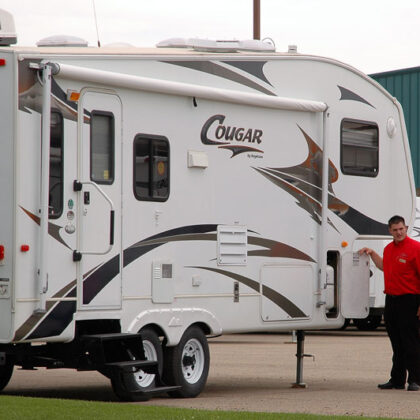
Thinking About Applying To A Workamping Job? Read This First.
Workamping offers incredible opportunities to travel, meet new people, and support your lifestyle on the road—but not all job offers are created equal. While most employers are fair and upfront, it’s important to be able to spot the warning signs of a potentially mismatched or even exploitative job.
Here are eight red flags to look for before committing to a Workamping position:
1. Vague or Missing Details
A legitimate employer should be clear about the scope of work, expected hours, compensation, season length, and start/end dates.
🚩 Red flag: Statements like “We’ll figure it out when you get here” or “It changes all the time” without offering any specifics.
2. Unclear or One-Sided Compensation
Some positions offer an RV site, utilities, and other perks in place of a wage. That can be a great deal—if the time commitment matches the value. Be cautious if the compensation seems out of balance.
🚩 Red flag: Expecting 30–40 hours per week per person in exchange for just a campsite.
3. No Written Agreement
Even a simple written summary via email can prevent misunderstandings. If the employer refuses to put anything in writing, that’s a major red flag.
🚩 Red flag: “Just trust us—we’ve never had problems before.”
4. Too Good to Be True
If a job promises high pay, minimal hours, tons of perks, and zero hassle, dig deeper. Good jobs do exist—but they come with clear expectations.
🚩 Red flag: Over-the-top promises without details to back them up.
5. Controlling or Rigid Attitude
Pay attention to how the employer communicates. Are they respectful of your time and lifestyle? Or do they seem rigid, dismissive, or even condescending?
🚩 Red flag: No flexibility in scheduling, or resistance to questions about work/life balance.
6. No Time Off or Overworking
Everyone needs downtime, even when you’re parked in paradise. Always ask about expected hours and time off.
🚩 Red flag: Jobs with 7-day schedules, no mention of days off, or “on-call 24/7” expectations.
7. Bad Reviews or Refusal to Provide References
If you can’t find any reviews on the employer and they dodge your request to speak with a past Workamper, take caution. Most good employers are happy to share references.
🚩 Red flag: Employer gets defensive when asked for past Workamper contacts.
8. Poor Communication
Pay attention to how responsive and clear the Employer is during the early stages of contact. If you’ve reached out—especially through multiple channels—and either get no reply, delayed responses, or vague/non-answers, take that seriously. Consistent, respectful communication is part of a healthy working relationship. If it’s difficult before you’ve even started, it’s unlikely to improve once you’re on-site.
🚩 Red flag: Employers who are unresponsive, avoid answering questions, or make you chase them down before you’re even hired.
Final Thoughts
Workamping can be an incredibly rewarding way to live and work—but only if the experience is mutually beneficial. Asking the right questions, trusting your gut, and walking away when something doesn’t feel right is part of the journey.
Take your time, do your homework, and don’t settle for a job that doesn’t respect your value. The right opportunity is out there—and when you find it, it’ll be worth the wait.
Check out these other blog posts to help you find the right Workamping opportunity for you:
👉 Steps to Finding the Right Workamping Job
👉 Researching a Potential Workamping Job
👉 Doing the Math on a Workamping Job
👉 Questions to Ask to Workamper Employers to Enhance Expectations
👉 Avoid Misunderstandings By Getting a Work Agreement
👉 Workamper Scams – Beware, Be Cautious, Be Sure, Be Safe






